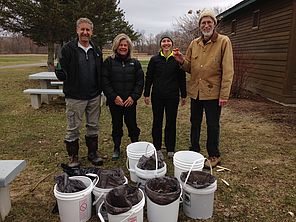Additional April Stools' Days

Stay tuned for additional clean-up days in April and May. Contact LCC to help organize a clean-up in your community or initiate some spring cleaning on your own. Whenever you have time, head out to your favorite park, trail or neighborhood with gloves, plastic bags and a sturdy trowel and help scoop the poop. Wear a safety vest if working near roadways. Pet poop should be flushed down the toilet or deposited in the garbage along with any other trash you find during your outings. Email us the date of your outing along with photos and some details on what you picked up to be entered into our prize pool and get a set of lake note cards for your efforts.
The Scoop on Dog Poop
Pet waste carries nutrients that feed the growth of weeds and algae in the water. EPA estimates that two or three days' worth of droppings from just 100 dogs contributes enough bacteria to temporarily close a waterbody to swimming and fishing. Woof-waste doesn't make good fertilizer; it burns grass and leaves unsightly discoloring. Infected pet poop can carry the eggs of roundworms and other parasites (like cryptosporidium, giardia, and salmonella) which can linger in soil for years. Anyone gardening, playing sports, walking barefoot, or digging in the infected dirt, risks coming into contact with those eggs. Children are most susceptible since they often play in the dirt and put things in their mouths.
